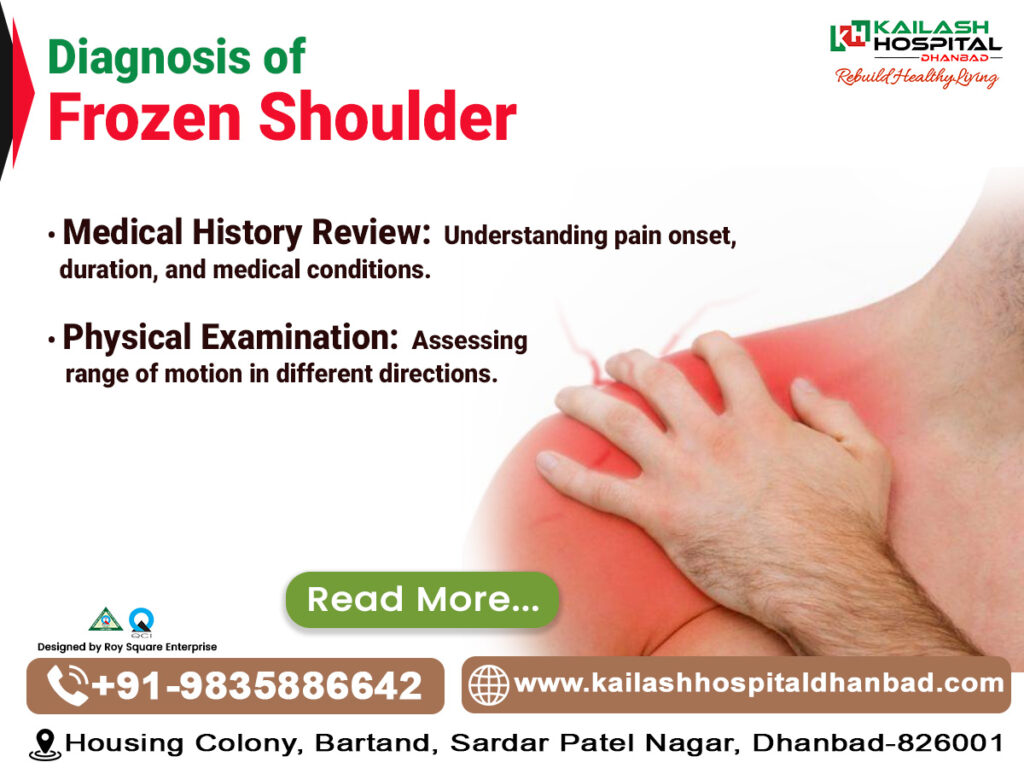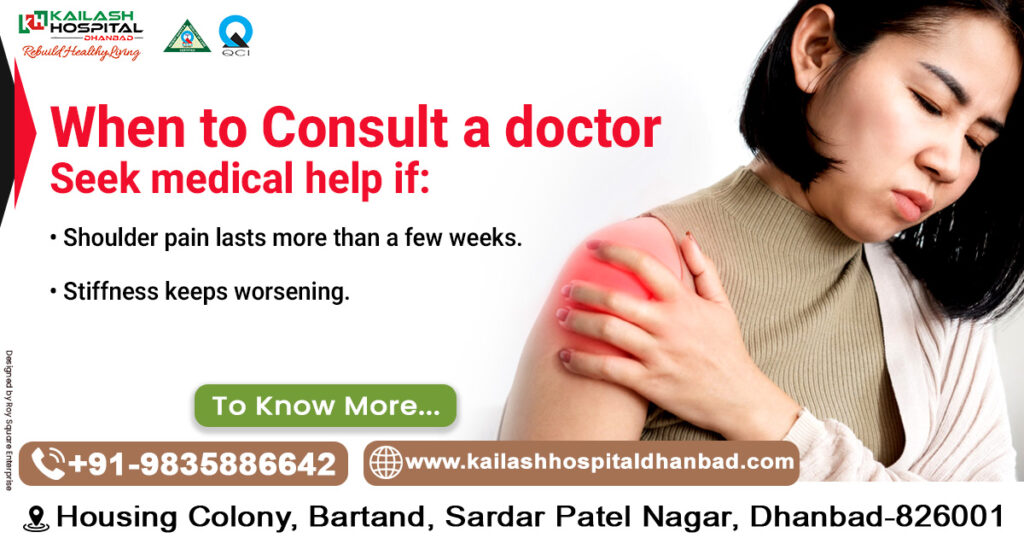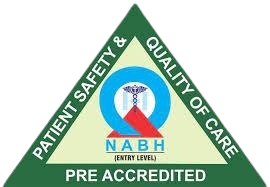When it comes to joint problems, shoulder pain is one of the most disabling issues many patients face. Among the different conditions that affect the shoulder, Frozen Shoulder – also known as Adhesive Capsulitis – stands out because of its gradual onset, severe stiffness, and prolonged recovery time.
According to Dr. Ashish Bajaj, Consultant Orthopedics at Kailash Hospital, Dhanbad, adhesive capsulitis is not just ordinary shoulder pain; it is a condition where the shoulder joint becomes inflamed and stiff, restricting movement and causing significant discomfort. It can severely affect day-to-day activities, from combing your hair to reaching for objects on a shelf.
In this comprehensive guide, we will explore what frozen shoulder is, its symptoms, causes, risk factors, and various treatment options, along with some prevention tips, to help patients better understand and manage the condition.
Understanding Frozen Shoulder
The shoulder is a ball-and-socket joint surrounded by a capsule of connective tissue. In adhesive capsulitis, this capsule thickens and tightens, leading to adhesions (scar tissue) and restricted movement.
Dr. Ashish Bajaj explains that frozen shoulder usually develops gradually in three stages:
- Freezing Stage:
- Pain increases gradually.
- Shoulder movement becomes difficult.
- This stage may last from 6 weeks to 9 months.
- Frozen Stage:
- Pain may reduce, but stiffness worsens.
- The range of motion is severely limited.
- Daily tasks become extremely challenging.
- This stage lasts 4 to 6 months.
- Thawing Stage:
- Movement starts improving.
- Pain continues to decline.
- Recovery may take 6 months to 2 years.
Symptoms of Frozen Shoulder
The hallmark symptom is pain and stiffness in the shoulder joint. But there are other signs patients must watch for:
- Dull or aching pain in the outer shoulder and sometimes upper arm.
- Pain worsening at night, disturbing sleep.
- Difficulty lifting the arm overhead.
- Inability to perform daily tasks like dressing, cooking, or driving.
- Gradual but persistent loss of shoulder movement.
Dr. Ashish Bajaj emphasizes that early recognition of these symptoms is key. Many patients initially mistake frozen shoulder for simple shoulder strain, delaying treatment.
Causes and Risk Factors
Frozen shoulder doesn’t always have a clear cause. However, several factors may increase the risk:
- Injury or Surgery
- Shoulder immobilization after an injury, fracture, or surgery can trigger frozen shoulder.
- Diabetes
- People with diabetes are at a higher risk, with up to 20% experiencing frozen shoulder.
- Other Medical Conditions
- Thyroid disorders, cardiovascular disease, and Parkinson’s disease can contribute.
- Age and Gender
- Most common between ages 40–60 years.
- Slightly more prevalent in women.
- Sedentary Lifestyle
- Lack of exercise or prolonged inactivity can worsen stiffness.
According to Dr. Ashish Bajaj, one of the biggest reasons frozen shoulders develops is not moving the shoulder enough after an injury or surgery. Early physiotherapy and guided exercises are critical for prevention.

Diagnosis of Frozen Shoulder
The diagnosis is usually clinical, meaning it’s based on symptoms and physical examination.
- Medical History Review: Understanding pain onset, duration, and medical conditions.
- Physical Examination: Assessing range of motion in different directions.
- Imaging Tests: X-rays or MRI may be done to rule out other shoulder problems such as arthritis or rotator cuff tears.
At Kailash Hospital, Dhanbad, Dr. Ashish Bajaj uses a combination of detailed patient history and physical assessments to confirm frozen shoulder and design a tailored treatment plan.
Treatment of Frozen Shoulder
The goal of treatment is to relieve pain, restore movement, and regain function. Since frozen shoulder often improves over time, treatment focuses on supportive measures.
1. Medications
- Painkillers and Anti-inflammatory drugs: Over-the-counter NSAIDs or prescribed medicines help reduce inflammation and pain.
- In some cases, steroid injections are recommended for severe pain.
2. Physiotherapy
The cornerstone of treatment, physiotherapy helps restore movement.
- Stretching exercises: Pendulum stretches, towel stretches, and cross-body reaches.
- Strengthening exercises once pain subsides.
- Regular sessions under expert supervision.
Dr. Ashish Bajaj stresses that consistent physiotherapy is the most effective treatment. Many patients give up too early, but discipline in exercises can shorten recovery time.
3. Heat Therapy
Applying warm compresses before exercises can relax the joint and reduce stiffness.
A procedure where sterile fluid is injected into the joint capsule to expand and improve movement.
5. Surgical Options
When conservative methods fail, surgical options may be considered:
- Manipulation Under Anesthesia (MUA): The shoulder is moved to break adhesions while the patient is asleep.
- Arthroscopic Capsular Release: A minimally invasive surgery to cut tight tissues.
At Kailash Hospital, Dhanbad, these advanced treatments are available under the care of Dr. Ashish Bajaj, ensuring patients get world-class orthopedic care.

Lifestyle and Home Remedies
Patients can also manage symptoms with simple lifestyle changes:
- Stay Active: Gentle, regular movements keep the joint flexible.
- Hot Showers: Warm water relaxes muscles and reduces stiffness.
- Posture Care: Avoid slouching, which worsens shoulder strain.
- Ergonomic Adjustments: Proper desk and chair setup for those working long hours.
- Healthy Diet: A balanced diet supports overall joint health.
Prevention Tips from Dr. Ashish Bajaj
Since frozen shoulder can take years to recover, prevention is crucial. Dr. Ashish Bajaj shares some effective tips:
- Early Movement After Injury or Surgery: Don’t keep the shoulder immobilized for too long.
- Diabetes Control: Keeping blood sugar in check reduces the risk.
- Regular Stretching: Especially for people with desk jobs or sedentary lifestyles.
- Timely Medical Attention: Don’t ignore persistent shoulder pain – early diagnosis prevents worsening.

When to Consult a doctor
Seek medical help if:
- Shoulder pain lasts more than a few weeks.
- Stiffness keeps worsening.
- Daily activities are affected.
- Pain disturbs sleep regularly.
At Kailash Hospital, Dhanbad, Dr. Ashish Bajaj provides comprehensive orthopedic care, combining medical expertise with patient-friendly treatment approaches. Consulting a specialist at the right time ensures faster recovery and avoids complications.
Key Takeaways
- Frozen Shoulder is a condition of stiffness and pain in the shoulder joint caused by thickened, inflamed connective tissue.
- It progresses in three stages: freezing, frozen, and thawing, often lasting up to 2 years.
- Common risk factors include diabetes, thyroid disorders, injury, surgery, and age (40–60 years).
- Symptoms: Persistent pain, limited movement, difficulty in daily activities.
- Treatment: Medications, physiotherapy, steroid injections, and in severe cases, surgery.
- Prevention: Early mobilization, exercise, and regular health check-ups.
Final Thoughts
Frozen shoulder can be painful and frustrating, but with the right approach, recovery is possible. Patience, consistency with physiotherapy, and timely medical guidance are the keys to overcoming this condition.
As Dr. Ashish Bajaj, Consultant Orthopedics, Kailash Hospital, Dhanbad highlights, “Early recognition and disciplined treatment can make all the difference. Frozen shoulder is treatable, but it requires teamwork between the doctor, physiotherapist, and most importantly, the patient.”
If you or your loved ones are struggling with shoulder stiffness, consult a qualified orthopedic specialist like Dr. Ashish Bajaj for accurate diagnosis and a personalized treatment plan. With expert care, you can regain movement, reduce pain, and return to your normal lifestyle.
Top 10 Myths vs Facts about Frozen Shoulder
Myth 1: Frozen shoulder is caused by cold weather.
Fact: Temperature has nothing to do with it. It’s due to inflammation and tightening of the joint capsule.
Myth 2: Only older people get frozen shoulder.
Fact: While common in 40–60 years, it can affect younger people too, especially after injuries or surgery.
Myth 3: Frozen shoulder and rotator cuff tear are the same.
Fact: They are different. Frozen shoulder is stiffness of the capsule, while rotator cuff tear involves tendon damage.
Myth 4: Resting the shoulder will cure frozen shoulder.
Fact: Prolonged rest makes it worse. Dr. Ashish Bajaj advises controlled exercise for recovery.
Myth 5: Surgery is the only solution.
Fact: Most cases recover with non-surgical treatments like physiotherapy, medication, and injections.
Myth 6: Frozen shoulder always comes back.
Fact: It usually occurs once in a shoulder. Rarely, the other shoulder may be affected later.
Myth 7: Exercise is harmful during frozen shoulder.
Fact: Gentle, guided exercises are essential for regaining mobility.
Myth 8: Frozen shoulder can be “cured overnight” with one treatment.
Fact: Recovery is slow and requires months of consistent therapy and medical care.
Myth 9: Only people with diabetes get frozen shoulder.
Fact: Diabetes increases the risk, but anyone can develop it.
Myth 10: Living with frozen shoulder is unavoidable.
Fact: With timely diagnosis, proper treatment, and physiotherapy under experts like Dr. Ashish Bajaj, patients can regain full movement and live pain-free.
Top 10 FAQs about Frozen Shoulder
1. What exactly is frozen shoulder?
Frozen shoulder (adhesive capsulitis) is a condition where the shoulder joint becomes stiff and painful due to thickening and tightening of the joint capsule.
2. Who is most likely to develop frozen shoulder?
People aged 40–60 years, especially women and those with diabetes, thyroid disorders, or post-surgery immobilization, are at higher risk.
3. How long does frozen shoulder take to heal?
According to Dr. Ashish Bajaj, adhesive capsulitis can last 1–3 years if untreated, but proper physiotherapy and treatment can speed up recovery.
4. Is adhesive capsulitis the same as arthritis?
No. adhesive capsulitis affects only the shoulder capsule, while arthritis affects multiple joints and involves cartilage wear.
5. Can adhesive capsulitis heal without treatment?
It may improve slowly, but without treatment, recovery can take years and leave permanent stiffness. Early care is always better.
6. What are the first signs of adhesive capsulitis?
Persistent pain, especially at night, followed by stiffness and difficulty raising the arm.
7. Can exercise worsen adhesive capsulitis?
No. Correctly guided stretching and physiotherapy help recovery. Overexertion without guidance may cause more pain, so consult a doctor or physiotherapist.
8. Is surgery always needed for adhesive capsulitis?
Not at all. Most patients recover with medicines and physiotherapy. Surgery is only for severe, non-responsive cases.
9. Can diabetes patients prevent adhesive capsulitis?
Yes, by keeping blood sugar under control and maintaining regular shoulder mobility.
10. When should I see a doctor?
If shoulder pain and stiffness last more than 2–3 weeks and interfere with daily tasks, consult an orthopedic specialist like Dr. Ashish Bajaj at Kailash Hospital, Dhanbad.



